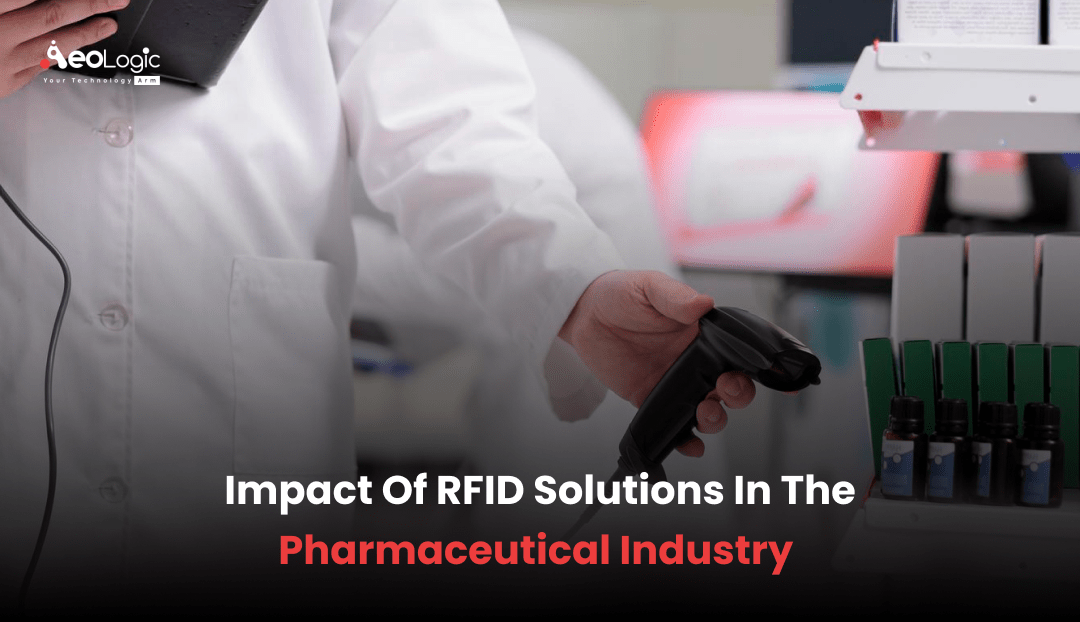When conditions are rapidly growing far and wide around us, health, well- being, and patient safety should be the top priority. This paves the way for using Radio Frequency Identification or RFID solutions in the pharmaceutical industry to serve more directly and efficiently. The use of this technology is a plus in the medical field as it helps ameliorate monitoring and tracing, supply accuracy, asset operation, and product authentication.
RFID solutions in the pharmaceutical industry can also help classify and categorize goods in pharmacies and hospitals, assuring quality and reducing waste. Ready to learn about the operations of RFID in the Pharmaceutical industry? Come with us as we unveil how this system is laterally saving our lives!
Also read: Benefits of RFID Solutions in Hospital and Clinical Pharmacy
RFID Solutions in the Pharmaceuticals Industry
Radio Frequency Identification is like a wireless tracking system that uses radio waves to shoot information from a label attached to an item to a reader device. It’s different from barcodes because it does not bear direct line of sight to checkup, and it can transmit data wirelessly, making it faster and more effective.
In the pharmaceutical assiduity, it’s used to keep track of the movement of drugs and medical inventories as they travel through the supply chain. Now, let’s cave into the exact operation of the same in the pharma field. Read On!
Bettered Product Authentication
Fake medicines are a major hazard to patient safety. Thus, by incorporating RFID markers in pharmaceutical businesses you can assure product authenticity in your drug packaging. These markers can also hold unique identifiers that can be validated along the supply chain, lowering the liability of fake specifics reaching the market. Can you guess what comes next? Right! It’s none other than managing your supplies.
More Inventory Management
Managing your supplies becomes a vital task especially when you’re associated with the pharma assiduity. Using RFID solutions in the pharmaceutical industry for your business can help you with real time visibility of supply situations, allowing you to keep applicable stock situations and also decreasing waste.
The capability to track your products with RFID markers allows for more accurate supply forecasting, reducing your charges and assuring that your stocks are available when demanded. Up next is each about managing your cold chains efficiently by using RFID technology.
Effective Cold Chain Management
RFID grounded systems in cold chains can help you descry the temperatures of your pharmaceutical particulars during their transportation and storehouse. It can also help you cover temperature oscillations, assuring that specifics are constantly maintained at the proper temperature.
Any divagation from the ideal circumstances results in an early alert, precluding spoiling and assuring product quality.
After cold chain operation, comes another important operation of RFID in your pharma business which is each about automating your supply chain.
Automated Supply Chain
You can fluently trace your pharma products using RFID technology. Each batch of medicinals is given a unique RFID label, enabling real time tracking at every step of your supply chain. Integration of RFID solutions in pharmaceutical industry for the supply chain allows you to cover drug conveyance from product to distribution centers, lowering the chance of lost or misdirected shipments and adding your overall effectiveness.
Last but not least, with the operation of RFID in the Pharmaceutical industry comes the safety of your patient.
Assuring Patient Safety
You can use RFID markers to track specific medicinal inventories and insure that they don’t expire or are reused. This lowers the liability of patient consuming dangerous medicines. Now let’s learn about the benefits that the use of radio frequency identification has brought to the pharma sector.
Integration of RFID in Supply Chain in the Pharmaceutical Industry
One of the topmost advantages of RFID technology in the pharmaceutical assiduity is its unity with being supply chain systems. However, it can give several benefits, if your pharmaceutical company integrates RFID data with enterprise resource planning (ERP) systems. Following are some benefits:
- Perfecting your supply chain visibility and control
- Enabling visionary decision making relating backups
- Optimising processes
- Assuring safety concerns
Apart from similar advantages have you ever wondered what can be the challenges and future trends to consider:
Challenges and Future Trends of RFID in the Pharmaceutical Industry
While RFID has made significant achievements in the pharmaceutical business, did you ever wonder what its obstacles are? Continue exploring further!
Cost – originally you may face significant costs when installing RFID bias for your pharmaceutical company. Still, as technology and the economy advances, the cost is likely to fall. Making it more affordable to a broader range of businesses.
Standardization – The pharmaceutical business presently lacks standardized RFID technology. To completely realize its eventuality, parties must unite to define common guidelines and morals for data sharing, enabling smooth compatibility.
New Technologies – As technology advances, new technologies such as blockchain and artificial intelligence are anticipated to round RFID in perfecting your supply chain operations.
Combining these advancements can affect in increased security, effectiveness, and clarity for your pharmaceutical business.
Also read: Role RFID Traceability in Medical Device Industry
Conclusion
In the pharmaceutical sector, RFID has proved itself to be an inventor transforming the ways drugs and pharma products are covered, traced, and managed. Apart from this, it has offered real advantages- boosting general productivity, guaranteeing patient safety, bettered product identification, quick supply chain. And effective monitoring of cold chains. Therefore, transforming supply chain operation in all terms.







